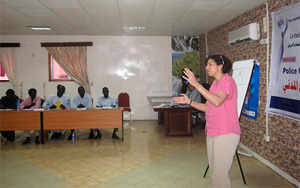Academy peacebuilding programs in Khartoum and police-community dialogues in Juba address the ongoing crises in north and south Sudan.
The Academy's Linda Bishai and Jacqueline Wilson traveled to Sudan between April 24 and May 7, 2011 for two separate programs in north and south Sudan. These programs are part of USIP's larger effort to address the ongoing crisis in Sudan and prevent the outbreak or recurrence of violent conflict.
The Khartoum program was a consultation with higher education stakeholders on teaching peacebuilding, in partnership with the Institute for the Development of Civil Society (IDCS). Special guests included the minister of state for higher education, the director of the Peace Research Institute at the University of Khartoum, and the chancellor of Al Ahfad University for Women.
The two-day consultation addressed issues of need, content, and implementation and resulted in three action committees: a post-graduate studies committee, a short course training committee, and a coordination and follow-up committee.
 The Juba program was a police-community dialogue facilitation training and included 42 participants from 5 states in the south. The training brought members of civil society and the police service together for facilitated discussion and also taught facilitation skills to the participants so they could manage future such dialogues on their own.
The Juba program was a police-community dialogue facilitation training and included 42 participants from 5 states in the south. The training brought members of civil society and the police service together for facilitated discussion and also taught facilitation skills to the participants so they could manage future such dialogues on their own.
In the past, these groups have had a contentious relationship; one civil society participant said it was a "miracle" he was even talking with the police. But the participants in both groups were enthusiastically engaged throughout and expressed appreciation for the opportunity to meet and talk in a neutral environment and to learn facilitation skills. At the end many participants committed to running such dialogues in their local communities. USIP and local partners will organize and fund facilitation teams to run these dialogues over the course of the next year.
Explore Further
- Sudan: The Current Situation and Going Forward
- Building Bridges through Intergroup Dialogue
- Stabilization and Peacebuilding
- Preventing Electoral Violence in Africa



